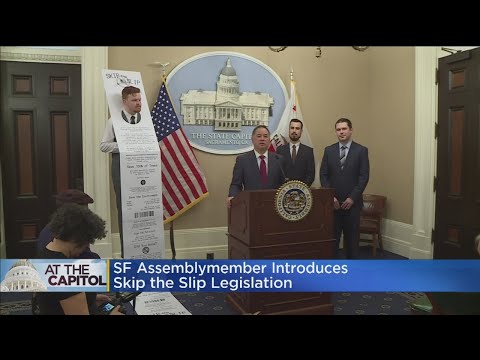California Lawmaker Pushes Bill To Ban Paper Receipts; Environmentalists say bill will Protect People from Toxins Including BPA
CALIFORNIA – A Democratic state lawmaker introduced legislation to get rid of paper receipts, but is using a bizarre justification for why paper receipts should be taken out of stores — they’re full of toxins.
Assemblyman Phil Ting, the bill’s sponsor, and his environmental allies say chemicals found on most receipts are coated with “toxins,” in particularly one called Bisphenol A (BPA).
“Almost all of these receipts have BPA,” Ting said during a press conference, adding BPA “is harmful to the environment, harmful to our health.”
“There’s a negative impact on the environment with these receipts, the inability to recycle them, as well as the contact with BPA.”
Ting’s bill would require all California businesses to offer digital receipts by January 2022, and only give paper ones to customers that specifically request them. Supporters say banning receipts would keep customers and workers from being exposed to “toxins” on receipts.
However, the depiction of BPA as a “toxin” differs from the opinions of experts and most international regulatory agencies, including the U.S. Food and Drug Administration.
“Eliminating paper receipts is fine — nobody really wants them, anyway,” Alex Berezow, vice president of scientific affairs at the American Council on Science and Health, told The Daily Caller News Foundation.
“But we shouldn’t fabricate reasons to support this policy,” Berezow said. “The miniscule amounts of BPA in receipt paper aren’t even remotely harmful.”
BPA is an industrial chemical used to make hard, clear plastics. The chemical is found in water bottles and beverage containers people use everyday. For years, environmentalists have argued it’s a dangerous “toxin” that needs to be taken out of circulation.
But the FDA says “BPA is safe at the current levels occurring in foods.” FDA based its opinion on reviews of hundreds of scientific studies. In February, the FDA released an extremely comprehensive study that looked at the effect of BPA in rats. Based on those results, the FDA said “BPA is safe for the currently authorized uses in food containers and packaging.”
In 2012 and 2013, the FDA no longer allowed for BPA to be used in baby bottles or formula packaging. The FDA stressed, though, that amending its regulations for infant products “is not based on safety,” but because industry stopped using the chemical in those products.
Green America, the environmental group backing the bill, however, said people face serious health risks from toxins absorbed into people’s skin when they touch receipts. The group said BPA is linked to “serious health problems, including numerous types of cancer, diabetes, and reproductive issues.”
“Over time, this legislation would prevent millions of trees from being logged for paper receipts, which fewer and fewer consumers want, and which often go straight to landfills,” Green America’s climate and recycling director Beth Porter said in a statement.
Green America cited an Ecology Center paper that estimated 93 percent of paper receipts are coated with BPA and BPS. Sounds scary, but do receipts actually pose a threat to public health?
Ting’s proposal mirrors a statewide ban on plastic straws in California that went into effect at the beginning of 2019. The cities of San Francisco and Seattle also passed laws to ban plastic straws last year, and the U.K. became the first country to pass a nationwide ban on plastic straws.
Ting also said his bill would “free consumers” of the burden of having to decide what to do with their receipts, like finding a trash can or a drawer to stuff them in. Apparently, having your email inbox cluttered is much more convenient.
“My understanding is already most retailers, especially most large retailers, their software, their point-of-sale systems, already can do this, so we’re giving them enough time to be able to implement it,” Ting said.
The cost? “We don’t have a cost estimate right now,” Ting told reporters Tuesday.



